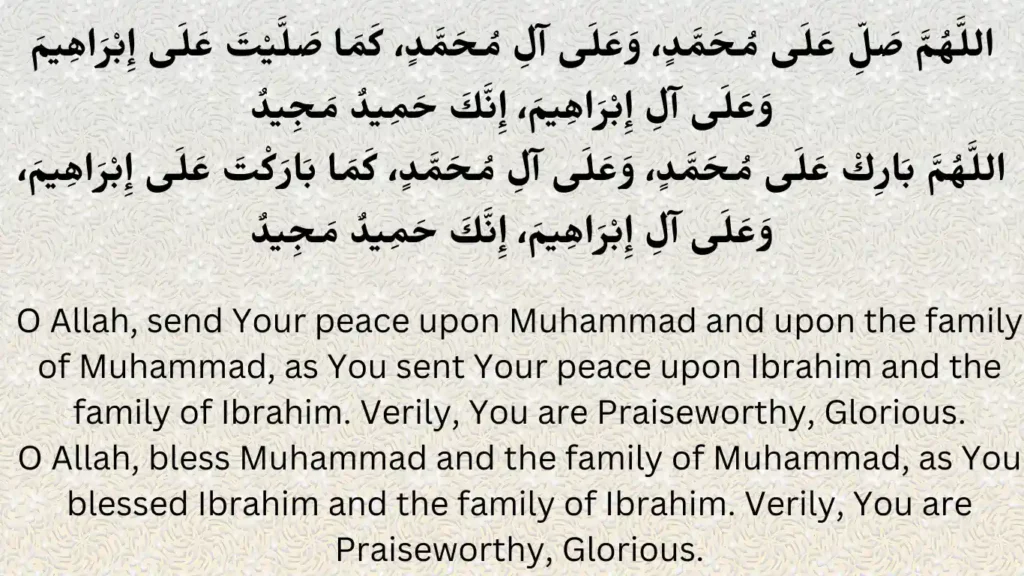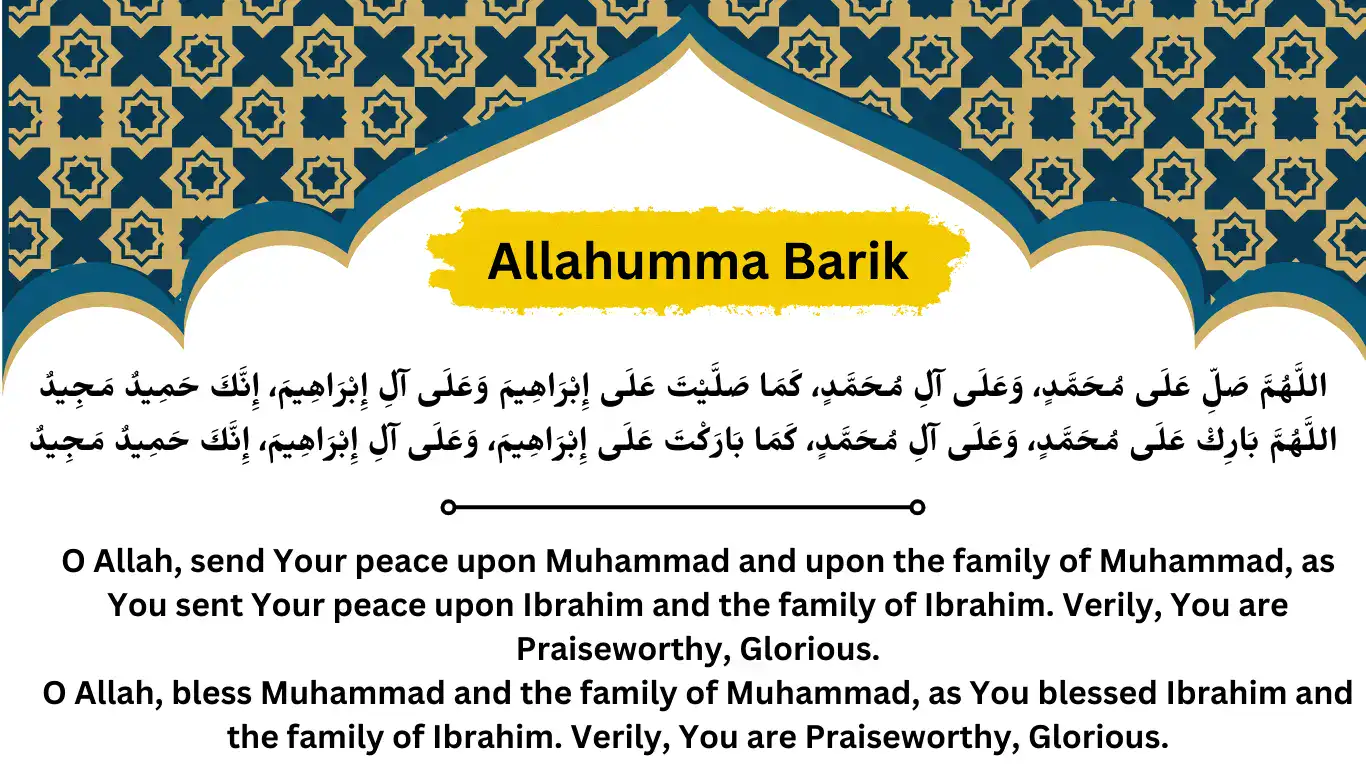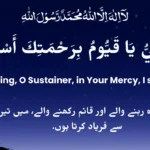Introduction
Allahumma Barik اللَّهُمَّ بَارِكْ is a phrase used to ask Allah to send blessings. This prayer, often recited in connection with the Prophet Muhammad (PBUH) and his family, embodies the desire for divine blessings and recognition of Allah’s mercy. In Islamic tradition, invoking blessings, especially upon the Prophet, holds immense spiritual significance. This article will explore the meaning and depth of the Allahumma Barik phrase, and how it connects to a broader prayer known as Salat al-Ibrahimiyya.
| Ya Hayyu Ya Qayyum Birahmatika Astaghees |
| Powerful Dua for Success | Allah’s Blessings |
| Dua Rabbana Atina Fid Dunya | رَبَّنَا آتِنَا فِىْ الدُّنْيَا |
| Hasbi Rabbi Jallallah Naat Lyrics in Urdu |
The Full Salat al-Ibrahimiyya Prayer in Arabic and English
Arabic Text:
اللَّهُمَّ صَلِّ عَلَى مُحَمَّدٍ، وَعَلَى آلِ مُحَمَّدٍ، كَمَا صَلَّيْتَ عَلَى إِبْرَاهِيمَ وَعَلَى آلِ إِبْرَاهِيمَ، إِنَّكَ حَمِيدٌ مَجِيدٌ
اللَّهُمَّ بَارِكْ عَلَى مُحَمَّدٍ، وَعَلَى آلِ مُحَمَّدٍ، كَمَا بَارَكْتَ عَلَى إِبْرَاهِيمَ، وَعَلَى آلِ إِبْرَاهِيمَ، إِنَّكَ حَمِيدٌ مَجِيدٌ
English Translation:
“O Allah, send Your peace upon Muhammad & upon the family of Muhammad, as You sent Your peace upon Ibrahim & the family of Ibrahim. Verily, You are Praiseworthy, Glorious.
O Allah, bless Muhammad & the family of Muhammad, as You blessed Ibrahim & the family of Ibrahim. Verily, You are Praiseworthy, Glorious.”

Meaning and Significance of “اللَّهُمَّ بَارِكْ“
The phrase “اللَّهُمَّ بَارِكْ” means “O Allah, bless.” In this prayer, we are asking Allah to send His blessings not only upon Prophet Muhammad (PBUH) but also upon his family, following the model of blessings given to Prophet Ibrahim (AS) and his family. This prayer reflects the honor and status Allah has given to both Prophet Muhammad (PBUH) and Prophet Ibrahim (AS) in Islamic tradition.
Verse-by-Verse Breakdown of Salat al-Ibrahimiyya
1. اللَّهُمَّ صَلِّ عَلَى مُحَمَّدٍ وَعَلَى آلِ مُحَمَّدٍ (Allahumma Salli Ala Muhammad wa Ala Aali Muhammad)
Meaning: “O Allah, send Your peace upon Muhammad and upon the family of Muhammad.”
Explanation: This initial part is a request for peace and blessings upon Prophet Muhammad (PBUH) and his family. Muslims believe that sending blessings upon the Prophet brings them closer to Allah and invokes peace in their lives.
2. كَمَا صَلَّيْتَ عَلَى إِبْرَاهِيمَ وَعَلَى آلِ إِبْرَاهِيمَ (Kama Sallayta Ala Ibrahim wa Ala Aali Ibrahim)
Meaning: “As You sent Your peace upon Ibrahim and the family of Ibrahim.”
Explanation: This phrase draws a comparison, asking Allah to bless Prophet Muhammad (PBUH) and his family in the same way He blessed Prophet Ibrahim (AS) and his family. It connects the two beloved prophets and their missions, creating a bond between the followers of both.
3. إِنَّكَ حَمِيدٌ مَجِيدٌ (Innaka Hameedum Majeed)
Meaning: “Indeed, You are Praiseworthy, Glorious.”
Explanation: Here, Allah’s attributes are acknowledged, emphasizing that He is both “Praiseworthy” and “Glorious.” This recognition of Allah’s qualities is a reminder of His greatness, which makes Him alone worthy of giving blessings.
4. اللَّهُمَّ بَارِكْ عَلَى مُحَمَّدٍ، وَعَلَى آلِ مُحَمَّدٍ (اللَّهُمَّ بَارِكْ Ala Muhammad wa Ala Aali Muhammad)
Meaning: “O Allah, bless Muhammad and the family of Muhammad.”
Explanation: This line requests blessings upon Prophet Muhammad (PBUH) and his family. This part of the supplication emphasizes the continuity of divine blessings and serves as a powerful reminder to seek Allah’s favor.
5. كَمَا بَارَكْتَ عَلَى إِبْرَاهِيمَ وَعَلَى آلِ إِبْرَاهِيمَ (Kama Barakta Ala Ibrahim wa Ala Aali Ibrahim)
Meaning: “As You blessed Ibrahim and the family of Ibrahim.”
Explanation: Again, this line draws a comparison with Prophet Ibrahim (AS), requesting similar blessings and connecting the two prophets’ missions, as both prophets brought guidance and divine laws to humanity.
6. إِنَّكَ حَمِيدٌ مَجِيدٌ (Innaka Hameedum Majeed)
Meaning: “Indeed, You are Praiseworthy, Glorious.”
Explanation: The prayer ends with praise of Allah, affirming His glorious and praiseworthy nature, highlighting that He alone is capable of granting blessings.
Why Do Muslims Recite “اللَّهُمَّ بَارِكْ” and Send Salutations?
Reciting “Allahumma Barik” in the Salat al-Ibrahimiyya is seen as a means to gain Allah’s favor and establish a spiritual connection with the Prophet (PBUH). This prayer is recited in each unit of Salah as a means of showing respect, love, and reverence. Moreover, sending blessings upon the Prophet is believed to bring blessings upon the person making the supplication.
Benefits of Reciting “اللَّهُمَّ بَارِكْ“
- Closeness to Allah: Regularly sending blessings upon the Prophet fosters a stronger connection with Allah.
- Enhanced Spiritual Peace: This prayer is a source of tranquility and protection for those who recite it.
- Divine Blessings: Invoking “Allahumma Barik” is a way to seek Allah’s blessings in all areas of life, not just for oneself but for the Prophet and his family.
How to Integrate “اللَّهُمَّ بَارِكْ” in Daily Life
“Allahumma Barik” can be added to personal prayers for various aspects of life, such as:
- For Health: “Allahumma Barik Fi Sihhati” – asking for blessings in health.
- For Wealth: “Allahumma Barik Fi Mali” – asking for blessings in wealth.
- For Knowledge: “Allahumma Barik Fi Ilmi” – seeking blessings in knowledge.
These variations allow Muslims to use “اللَّهُمَّ بَارِكْ” in versatile ways, making their supplications more heartfelt and personalized.
FAQs:
اللَّهُمَّ بَارِكْ” means “O Allah, bless.” It is a prayer for divine blessings, used to seek Allah’s favor and barakah (blessings) in various aspects of life.
Muslims say “اللَّهُمَّ بَارِكْ” to request Allah’s blessings on the Prophet Muhammad (PBUH) and his family. It is a means of respect and a way to draw closer to Allah by remembering His beloved Prophet.
اللَّهُمَّ بَارِكْ” can be used in personal prayers to ask for blessings in specific areas like health, wealth, family, or time. For example, “Allahumma Barik Fi Rizqi” means “O Allah, bless my sustenance.”





Simply want to say your article is as astonishing.
The clearness in your post is just nice and i can assume you
are an expert on this subject. Fine with your permission allow me to grab your RSS feed to keep updated with forthcoming post.
Thanks a million and please carry on the rewarding work.